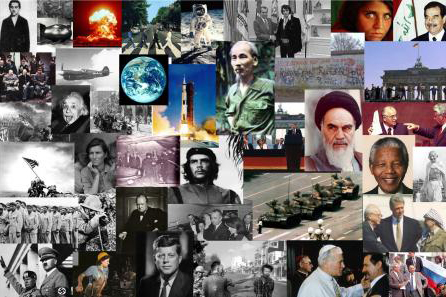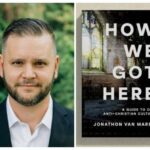Blog Post
The Century that Changed Everything
By Jonathon Van Maren
INTRODUCTION
As the crisp notes of the Last Post sounded across the cenotaph and the crowds gathered for the Remembrance Day Ceremony shifted almost in unison, I studied the clump of medal-laden military men sitting and standing near the row of wreaths. Only one was old enough to be a veteran of the Second World War, and he was shriveled with age like one of the brown leaves scritching their way across the sidewalk. In order to have served in what we all once referred to as “the War,” he had to be in his nineties. There used to be dozens of World War II servicemen and women gathered to commemorate the war dead each year, but the crowds of old men at the cenotaph have thinned as one by one, they take their place in the cemetery.
Over the last few years, I have caught myself struggling with the realization that the Greatest Generation—those who lived through the Great Depression and the Second World War—are almost all gone. To me, they seemed to anchor us, somehow, to a time when we still knew what was right and wrong, when we knew what was important and what was worth fighting for. Without them, I feel as if we are somehow lost, unmoored in a new century where all of the old certainties are gone and we are fast approaching a time when those who remember them are all gone, too. Orphans, in some strange historical sense. These events used to feel so real and so near, but now there are two generations between them and my little daughter, who will probably see the Great War as something as distant as the Napoleonic Wars and “the War” as something long, long ago. I occasionally get the distinct sensation of drifting out to sea, with the sight of land growing fuzzy and hard to discern.
With the dawn of 2020, I was struck by the fact that in my mind, time seems stuck around the year 2000. When someone talks about “thirty years ago,” my mind jumps to 1970, not to 1990. If I hear reference to a war fifty years ago, I instinctively think of the Second World War, not Vietnam. And it rather goggles me to think of the fact that September 11, 2001 was nearly two decades ago, when that stunning and terrifying morning feels like just a few weeks past. The fact is that the 20th century is rapidly fading in the rear-view mirror, especially as social media and the 24-7 news cycle traps us perpetually in the tyranny of the present. A generation born in this century rather than the last one is driving elections, setting the agenda, and shaping the culture. And they are doing so with virtually no knowledge whatsoever of the past.
I have had the opportunity over the past decade or so to speak to many eye-witnesses of the 20th century, men and women who saw and survived awful things. Many of them passed away shortly after I interviewed them: Lord George Weidenfeld, friend of popes and presidents, who fled Nazi Austria; Leon Leyson, who survived the Holocaust in Oskar Schindler’s factory; George Walker, the first African American to win the Pulitzer Prize for music. Our opportunities to hear about the events of the first half of the 20th century from those who actually witnessed them are vanishing by the day, and for those of us who value the perspectives of those who lived in what seems like a foreign world, that fact brings with it a keen urgency.
With that in mind, I hope in the coming year to present a monthly 12-part series (this introduction being the first installment) on the history of the 20th century, in hopes that it will assist both myself and others in better understanding how we came to be where we are in 2020. I spent two hundred pages in my 2016 book The Culture War explaining how the Sexual Revolution successfully infiltrated and conquered the West, and many readers have since asked me to go more in depth (a frequent question is: How did Christianity in the West die, and how did the Sexual Revolution conquer it?). To do this, I have been interviewing the veterans of 20th century conflicts, Holocaust survivors, historians, writers, and eye-witnesses. The series will begin with the dawn of the 20th century and end with September 11, 2001, which to my mind is the day that the 20th century truly ended and a new era was ushered in. These essays will feature the voices of some of the last living eye-witnesses to the events they describe, and some of the greatest historical minds in the West have assisted me in understanding and explaining how the past century unfolded.
As an important side note, I will not be covering some events that I have already spent substantial time detailing here. Russia is obviously a key player throughout the 20th century, and I have already written a four-part series on Christianity from the Baptism of Russia to persecution in the Soviet Union, and so I will be examining Russia’s impact as an international player rather than revisiting her internal affairs. I have also already published a lengthy essay on the Armenian Genocide, which was consequently posted on social media by the Armenian ambassador to the Netherlands, the Armenian ambassador to Latvia-Lithuania, as well as a director of the Armenian Ministry of Foreign Affairs. I will be focusing on events that I have not previously covered, and referring back to other essays and interviews where context is necessary
I hope that you find it helpful.









Jonathon, if you are looking for when things started to come off the rails you need to start with Marsilius of Padua and his work Defensor pacis (“Defender of the Peace”), it pretty much-started snowballing from there.
Good people usually prefer to believe there are no evil people and to avert their gaze and live untainted in peace. Evil people work while pretending this is true and encouraging the belief to pave their way forward. They cooperate w/ea other in evil pursuit while good people are living independently and w/o a desire to take over. Good people need to become aware of the forces amassed against them and their ability to enjoy a decent, free life. Don’t want to, but will regret meeting the challenge of facing an unpleasant reality when it overwhelms life and ruins it.
Just came across this and looking forward to reading it
Am expectantly looking forward to reading each installment of the next several months. Very insightful and history that each young person needs to know. If we do not know the past, we are doomed to repeat it.